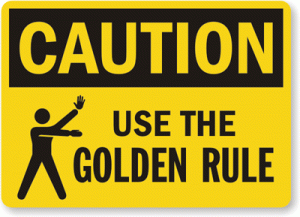
The issue popped up again yesterday. This time, in a New York Times op-ed by Jamelle Bouie.
Bouie suggests that if the Democrats hit the trifecta in the next election — meaning majorities in the House and Senate and winning the White House — that the Dems should pack the Supreme Court with extra judges that they see as favorable.
This is to make up for, he says, the stolen seat that Neil Gorsuch holds because Senate Majority Leader Mitch McConnell refused to do his constitutional duty of holding a hearing and vote on Obama’s pick, Merrick Garland, and the circus behind the confirmation hearing of Brett Kavanaugh when the FBI wasn’t permitted by the Senate to do its full investigation of the candidate and the allegations against him.
Sounds great, huh? Just pack the court to even things out? What could possibly go wrong?
This is as good a time as any to discuss the Golden Rule of Laws. This rule states that when you want to use some legal maneuver to attack “the other side” ask yourself how “the other side” could likewise use it.
While the name might be my creation the concept is not exactly new: What goes around comes around. What’s good for the goose is good for the gander. Karma. You get it.
But Bouie doesn’t get it. He says that in response to the Republican hardball that resulted in these two seats the Democrats should play hardball back. By packing the Court.
He comes to this conclusion by citing a litany of problems, including:
In the past, courts have walled entire areas of American life off from federal action. They’ve put limits on American democracy and blocked the people, through their representatives, from tackling fundamental issues of public concern. During Reconstruction, courts handcuffed the government as it tried to address violence and state-sanctioned racism; during the Progressive Era, they kept Congress from putting the economy under some measure of democratic control.
We’re living through a version of this right now. Under Chief Justice John Roberts, the Court has denied Medicaid coverage to millions of poor people, neutered the Voting Rights Act, authorized new waves of voter suppression, unleashed the power of money for entrenched interests and would-be oligarchs, and opened the door to extreme partisan gerrymandering.
But there’s a significant difference between identifying problems and coming up with good solutions.
And court packing doesn’t really solve any of the problems, does it? When the political tides flip back, and they surely will, the Republicans can do the same thing. And add yet more judges. Just as the Democrats will one day hold up a Supreme Court seat under the “McConnell Rule” in response to the Garland nomination.
When it comes to the potential dangers of the new tactic, he is dismissive:
Yes, there’s the risk of escalation, the chance that Republicans respond in turn when they have the opportunity. There’s also the risk to legitimacy, to the idea of the courts as a neutral arbiter. But Trump and McConnell have already done that damage. Democrats might mitigate it, if they play hardball in return.
Bouie is not alone in walking this dangerous path. Former governor and presidential candidate Howard Dean suggests that, instead of packing the Court, that certain unfavorable Supremes be rotated out to the trial level District courts. In a tweet he wrote:
Actually the Supreme Court is NOT for life. The Constitution says the federal bench is for life. Which means Supreme Court Justices can be rotated off onto district courts. Since two of them were put on illegitimately, that is important to know.
Same problem, of course. The Republicans can do the same thing when the time comes.
As David Boaz of the libertarian Cato Institute wrote when I twitted about Dean’s proposal: In my experience, neither side ever asks, What if my opponents had this power?
Now there are solutions floating around for de-politicizing the Court. Term limits of 18 years are one example. With a regular rotation of judges each seat and each appointment becomes less of a concern as folks no longer worry about an ideologue on the court for 30+ years. De-politicizing the Court should be a goal of both parties. But, alas, those in power don’t seem to agree.
This concept of fashioning new laws and rule without regard to how others might (ab)use them also came up two weeks ago when the San Francisco Board of Supervisors dubbed the NRA a “domestic terrorist organization.” As Walter Olson, also of the Cato Institute noted, this concept has repercussions. What organization is next, but this time from a red state/city? Maybe a pro-immigrant group? A group protesting police violence?
Think some Bible Belt city might want to take a shot at Planned Parenthood by calling it a terrorist organization?
In the race to play hardball one must always, always, always, always ask: How can this come back to bite me in the ass? Because one day it will.